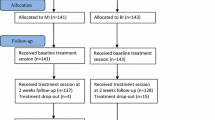Abstract
Purpose
Guidelines recommend screening patients with cancer to identify their rehabilitation needs. To help quantify this area of need and associated workload from an occupational therapy perspective in patients with thoracic cancer, we report the experiences of a dedicated rehabilitation service.
Methods
Consecutive patients were screened soon after diagnosis using items associated with occupational performance in the Sheffield Profile for Assessment and Referral for Care questionnaire. Those reporting predetermined levels of distress underwent a full occupational therapy evaluation; this generated a problem list from which individualised goals and interventions were instigated.
Results
Of 540 patients screened, 273 (51 %) reported levels of distress which warranted a full occupational therapy assessment. Of these, 260 (95 %) reported a total of 681 problems (median of 4 [2–5] per patient). Mostly these lay within the domain of self care (553, 78 %) in the categories of transfers, functional mobility and bathing/showering. A total of 646 goals (median of 2 [1–3] per patient) were formulated, resulting in 652 individual interventions, most frequently the provision of equipment (79 %) or advice (32 %) and referral to another professional/agency (23 %). Patients considered that most goals were achieved (98 %) and that the provision of equipment was useful (97 %).
Conclusions
About half of patients with thoracic cancer screened have occupational therapy needs around the time of diagnosis. Problems are mostly in the area of self-care, with equipment provision the most frequent intervention provided. Future work should examine the efficacy of occupational therapy interventions further.
Similar content being viewed by others
References
National Institute for Health and Clinical Excellence (2004) Improving supportive and palliative care for adults with cancer: the manual. National Institute for Health and Clinical Excellence, London
National Cancer Action Team (2009) Cancer and palliative care rehabilitation workforce project: a review of the evidence. National Cancer Action Team, London
National Cancer Rehabilitation Advisory Board (2012) Cancer and palliative care rehabilitation: a review of the evidence update. National Cancer Action Team, London
National Cancer Action Team (2007) Holistic common assessment of supportive and palliative care needs for adults with cancer: assessment guidance. National Cancer Action Team, London
Ahmed N, Bestall JC, Payne SA, Noble B, Ahmedzai SH (2009) The use of cognitive interviewing methodology in the design and testing of a screening tool for supportive and palliative care needs. Support Care Canc 17:665–73
Wilcock A, Klezlova R, Coombes S, Rawson A, Bentley R, Hooper D, Maddocks M (2010) Identifying supportive and palliative care needs in people with a recent diagnosis of thoracic cancer: acceptability of the SPARC questionnaire. Thorax 65:937–938
National Research Ethics Service (2010) Defining research: NRES guidance to help you decide if your project requires review by a research ethics committee. National Patient Safety Agency, London
Oken MM, Creech RH, Tormey DC, Horton J, Davis TE, McFadden ET, Carbone PP (1982) Toxicity and response criteria of the eastern cooperative oncology group. Am J Clin Oncol 5:649–655
Law M, Baptiste S, Carswell A, McColl M, Polatajko H, Pollock N (2005) Canadian occupational performance measure, 4th edn. CAOT Publications, Ontario
National Institute for Health and Clinical Excellence (2011) Clinical guideline 121. The diagnosis and treatment of lung cancer. National Institute for Health and Clinical Excellence, London
Taylor K, Currow D (2003) A prospective study of patient identified unmet activity of daily living needs among cancer patients at a comprehensive cancer care centre. Aust Occup Ther J 50:79–85
Harrison JD, Young JM, Price MA, Butow PN, Solomon MJ (2009) What are the unmet supportive care needs of people with cancer? A systematic review. Support Care Canc 17:1117–1128
Kealey P, McIntyre L (2005) An evaluation of the domiciliary occupational therapy service in palliative care in a community trust: a patient and carers perspective. Eur J Canc Care 14:232–246
Lemoignan J, Chasen M, Bhargava R (2010) A retrospective study of the role of an occupational therapist in the cancer nutrition rehabilitation program. Support Care Canc 18:1589–1596
Silver JK, Gilchrist LS (2011) Cancer rehabilitation with a focus on evidence-based outpatient physical and occupational therapy interventions. Am J Phys Med Rehabil 90:S5–S15
Vargo MM (2008) The oncology-rehabilitation interface: better systems needed. J Clin Oncol 26:2610–2611
National Cancer Action Team (2012) Rehabilitation care pathways. Available from: www.ncat.nhs.uk/our-work/living-with-beyond-cancer/cancer-rehabilitation#tab-inaction. Accessed 15 August 2012
Acknowledgments
We thank colleagues for their support, in particular Helena Alvey, Cheryl Percival, Kathy Blythe, Julie Upton, members of the project steering group and the lung cancer nurse specialists: Sandra Hummerston, Jill Allsop, Claire Darlington, Louise Greenfield and Katie Manning. The SPARC© questionnaire was used with permission of Professor Sam Ahmedzai, University of Sheffield, UK. This work was supported by Macmillan Cancer Support who had no role in the study design, data collection, analysis and interpretation, writing of the report or decision to submit the paper for publication. MM is funded by an NIHR Post-Doctoral Fellowship award. The views expressed in this publication are those of the authors and not necessarily those of the NHS, the NIHR or the Department of Health.
Conflicts of interest
None of the authors have any conflict of interest to declare.
Author information
Authors and Affiliations
Corresponding author
Rights and permissions
About this article
Cite this article
Bentley, R., Hussain, A., Maddocks, M. et al. Occupational therapy needs of patients with thoracic cancer at the time of diagnosis: findings of a dedicated rehabilitation service. Support Care Cancer 21, 1519–1524 (2013). https://doi.org/10.1007/s00520-012-1687-1
Received:
Accepted:
Published:
Issue Date:
DOI: https://doi.org/10.1007/s00520-012-1687-1




